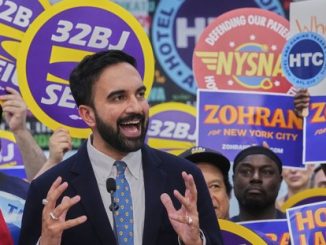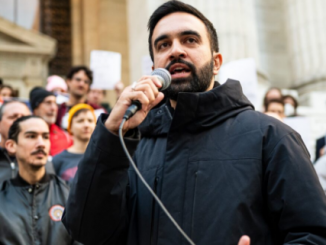
| Published July 7, 2025
New York City, NY — New York State Assemblyman Zohran Mamdani is once again making headlines—not for moderate reforms or budgetary solutions—but for openly embracing the core tenets of literal communism and suggesting they be implemented in America’s largest city.
In a recent public statement and subsequent social media posts, Mamdani—a member of the Democratic Socialists of America and representative of Queens—outlined his vision for what he calls a “just and equal city.” But critics say his rhetoric is pulled straight from Marxist doctrine.
“The means of production must be owned and operated by the people, not corporations,” Mamdani declared at a rally over the weekend. “Housing is a right, not a commodity. Transportation should be free. Wealth must be redistributed—not hoarded by billionaires.”
To many on the left, Mamdani’s message resonates. But to economists, small business owners, and city taxpayers, it sounds alarm bells.
Critics Warn of Dangerous Overreach
“This isn’t progressive policy—it’s a direct assault on private enterprise,” said Jonathan Stern, a Manhattan-based political analyst. “Mamdani is advocating for centralized economic control, government takeover of housing, and class warfare. That’s not reform—it’s communism.”
Mamdani has long championed causes like universal rent control, defunding the police, and a massive public takeover of utilities—policies he believes would empower working-class residents and “liberate” the city from capitalism.
But experts point to cautionary tales from history.
“We’ve seen where these ideas lead—Venezuela, the USSR, even Maoist China,” said Julia Martinez, an economist at the Urban Policy Center. “State ownership sounds utopian until shelves are empty and dissent is criminalized.”
A DSA Blueprint for NYC
Mamdani’s rhetoric aligns with the Democratic Socialists of America’s broader goals, which include abolishing profit motives in housing, banning private health insurance, and ultimately eliminating capitalism itself. The assemblyman has even praised Cuba’s “people-first” healthcare model and called for “decolonizing” economic systems.
Opponents say this isn’t idealism—it’s extremism.
“He’s not hiding it anymore,” said Brooklyn resident and community organizer Luis Romero. “Zohran wants the state to own everything and tell us what we can do with our money, our property, and our businesses. That’s not New York—that’s Marx’s manifesto.”
What Comes Next?
As NYC grapples with rising crime, a housing crisis, and staggering public debt, Mamdani’s radical vision is gaining traction among younger, activist-minded voters. His supporters argue the city needs a fundamental reset. His opponents fear it’s a path toward collapse.
The question facing New Yorkers now is simple: Do they want a city governed by liberal democracy—or by the blueprint of literal communism?
 Implications
Implications
🔴 1. Economic Implications
a. State Control of Property and Businesses
Mamdani’s rhetoric suggests public ownership of housing and utilities. If fully implemented, this could mean:
-
Abolishment of private landlords
-
City-managed housing distribution
-
Nationalization or municipal takeover of utility companies
This could disrupt real estate markets, undermine private investment, and potentially lead to inefficiencies typical of government-run services.
b. Redistribution of Wealth
Policies like steep taxation on the wealthy, free public services, and guaranteed income could:
-
Disincentivize entrepreneurship and capital inflow
-
Push high-net-worth individuals and corporations to relocate
-
Lead to higher costs on remaining taxpayers to sustain social spending
c. Business Flight or Collapse
With hostility toward profit motives, small and medium-sized businesses may:
-
Shut down or move to business-friendlier states
-
Reduce hiring, leading to increased unemployment
-
Face burdensome regulations or expropriation
🔴 2. Political Implications
a. Normalization of Far-Left Ideology
If Mamdani’s ideas gain mainstream traction:
-
NYC could become a model city for democratic socialism
-
The Democratic Party may face internal pressure to move further left
-
Traditional liberals may be marginalized by DSA-aligned progressives
b. Constitutional and Legal Challenges
Many of Mamdani’s ideas—like forced public ownership of private assets—could:
-
Conflict with the U.S. Constitution’s protections of private property
-
Trigger lawsuits from individuals, landlords, and corporations
-
Require massive legislative overhauls unlikely to pass statewide or nationally
c. Political Polarization
Embracing literal communism could intensify the political divide:
-
Fueling backlash from conservatives, moderates, and centrists
-
Leading to political instability or voter flight from the city
-
Increasing support for anti-socialist candidates in future elections
🔴 3. Social and Cultural Implications
a. Changing Notions of Rights and Freedoms
-
Property ownership might be framed as exploitation rather than achievement
-
Free expression could be chilled if dissent is labeled as “anti-justice”
-
Dependency on government institutions could increase
b. Urban Exodus
Wealthier, middle-class, or freedom-conscious residents may:
-
Move to suburban or out-of-state areas
-
Take jobs, capital, and cultural influence with them
-
Leave behind a city increasingly dependent on government aid
c. Empowerment or Control?
Supporters would argue these changes uplift the working class. Critics argue:
-
The state becomes too powerful, controlling housing, jobs, and information
-
Individuals lose choice, incentive, and autonomy
-
NYC could mirror failed socialist experiments elsewhere
 Overall Takeaway: A Dangerous Experiment in Radicalism
Overall Takeaway: A Dangerous Experiment in Radicalism
Zohran Mamdani’s vision isn’t bold reform—it’s a reckless ideological experiment rooted in the failed promises of communism. By advocating for government control over housing, utilities, and wealth, he’s not addressing the city’s real problems—he’s threatening to make them worse.
New York City doesn’t need Marxist economics or forced redistribution. It needs safer streets, economic freedom, and leaders who respect individual liberty, property rights, and the entrepreneurial spirit that built this city in the first place. Mamdani’s ideas may appeal to radical activists, but for everyday New Yorkers, they are a blueprint for economic decline, political chaos, and loss of freedom.
History has already shown us where communism leads. We don’t need to repeat those mistakes in America’s largest and most iconic city.





Be the first to comment